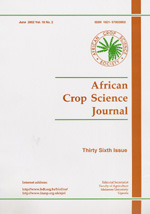
|
African Crop Science Journal
African Crop Science Society
ISSN: 1021-9730
EISSN: 1021-9730
Vol. 15, No. 1, 2007, pp. 51-57
|
 Bioline Code: cs07006
Bioline Code: cs07006
Full paper language: English
Document type: Short Communication
Document available free of charge
|
|
|
African Crop Science Journal, Vol. 15, No. 1, 2007, pp. 51-57
| en |
Sources of Stem Rust Resistance in Ethiopian Tetraploid Wheat Accessions
Beteselassie, Naod; Fininsa, Chemeda & Badebo, Ayele
Abstract
Stem or black rust of wheat caused by the fungus Puccinia graminis f. sp. tritici
 Ericks
Ericks and Henn (Pgt) is an important disease on wheat worldwide. Pgt is an obligate biotroph, heteroceous in its life cycle and heterothallic in mating type. Seedlings of 41 emmer ( Triticum dicoccum

), 56 durum ( T. durum) wheat accessions were tested for their response to stem rust ( Puccinia graminis f. sp. trictici) infection under greenhouse condition at Kulumsa Agricultural Research Center, Ethiopia. The test included screening of accessions and multipatotype testing to postulate sr genes. Vigorous screening of accessions was conducted using ten stem rust races, namely TKM/J, SKM/J, TTM/J, STM/J, TTL/K, TKR/J, TKM/J, TTM/H, SKM/J and JKM/G and, 33 stem rust differential lines. Flor's gene-for-gene theory was applied to postulate Sr genes in the tested accessions. Eighteen emmer and 6 durum accessions were found to be good sources of resistance to stem rust infection. In addition, the presence of Sr 7b, 8b, 9a, 9b, 10, 14, 24, 27, 28, 29, 30, 31, 32 and Tt-3 + 10 genes was postulated in 16 selected emmer and 5 durum wheat accessions. Hence, efforts to exploit these valuable Sr genes in Ethiopian cultivated tetraploid wheats could be rewarding to get stem rust resistant varieties and boost wheat production.
Keywords
Puccinia gramis, F. sp tritia, T. duram. T. dicoccum, Ethiopia
|
| |
| fr |
Beteselassie, Naod; Fininsa, Chemeda & Badebo, Ayele
Résumé
La tige ou la rouille noire du blé causée par la moisissure Puccinia graminis f. sp. tritici
 Eriks
Eriks et Henn (Pgt) est une maladie sérieuse universelle du blé. Le Pgt est une biotrophe, un hétérocious obligatoire dans le cycle de sa vie et un hétérothalique dans l'accomplissement de son espèce. Les jeunes plantes de 41 emmer ( Triticum dicoccum

), 56 durum ( T. durum) nouvellement acquises étaient examinées en fonction de l'infection de la tige par l'infection de la rouille ( Puccinia graminis f.sp. trictici) sous la condition de serre au Centre de Recherche Agronomique de Kalunsa en Ethiopie. L'expérience comprenait la sélection du blé nouvellement acquis et le test multipatotype pour postuler les gènes Sr. Une sélection rigoureuse de nouvelles acquisitions était entreprise en utilisant 10 races de tiges rouillées:TKM/J, SKM/J, TTM/J, STM/J, TTL/K, TKR/J, TKM/J, TTM/H, SKM/J et JKM/G et 33 tiges rouillées de traits différentiels. La théorie de Flor's gène-pour-gène était d'application pour postuler les gènes Sr pour l'examen des acquisitions nouvelles. Dix-huit emmer et six acquisitions nouvelles de durum étaient estimées comme source de résistance contre la contamination de la tige rouillée. En plus, la présence du Sr 7b, 8b, 9a, 9b, 10, 14, 24, 27, 28, 29, 30, 31, 32 et Tt-3+10 gènes étaient postulés dans 16 emmer sélectionnées et 5 durum du blé nouvellement acquis. Dès lors, des efforts pouvant permettre l'exploitation de ces Sr gènes Sr précieux des tétraploïdes éthiopiens cultivables pouvaient être considérés comme un don en tant que variétés résistant à la rouille des tiges et à la multiplication de la production du blé.
Mots Clés
Puccinia gramis, F. sp tritia, T. duram. T. dicoccum, Ethiopie
|
| |
© Copyright 2007 - African Crop Science Society
|
|
